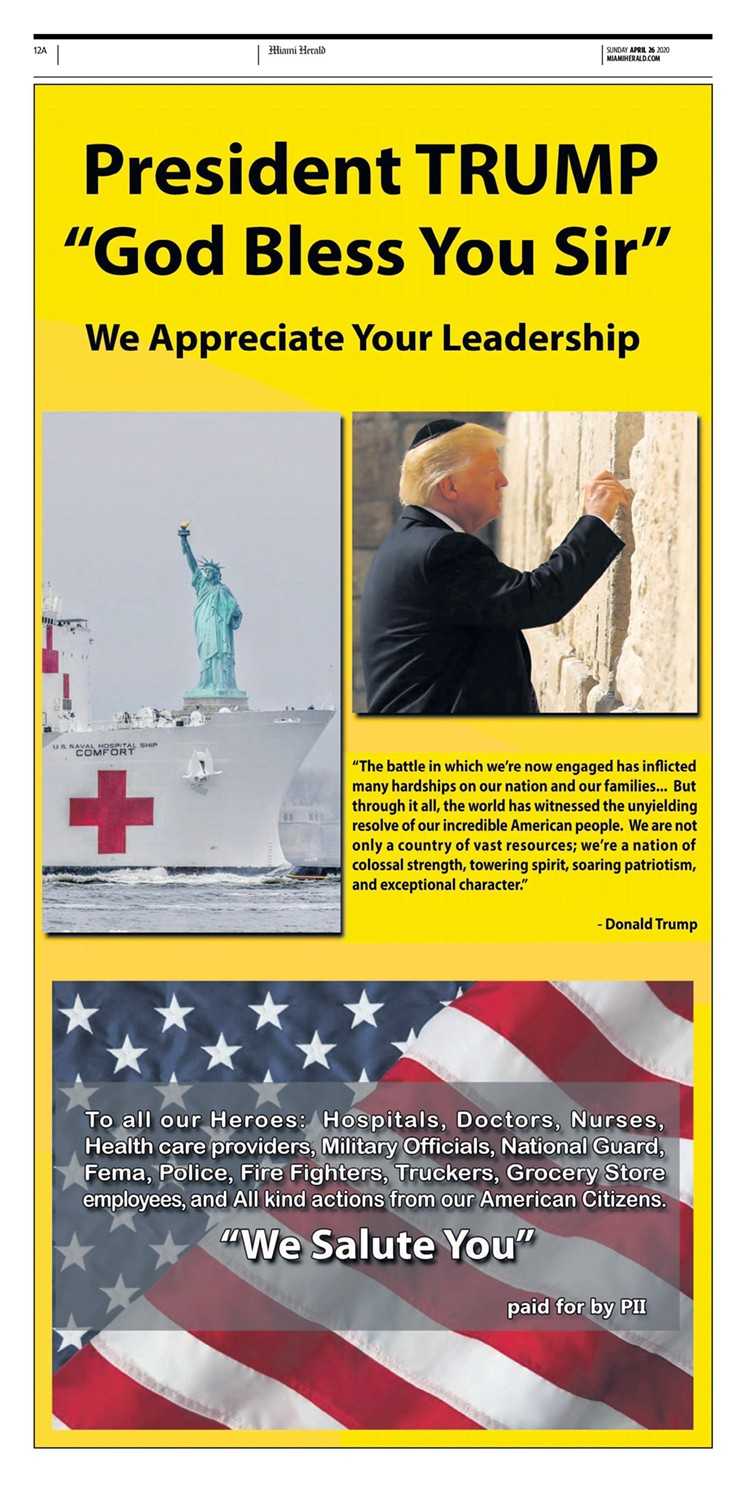On April 26, the U.S. death toll from COVID-19 surpassed 52,000. The Centers for Disease Control and Prevention announced there were six new possible symptoms of coronavirus that Americans should be aware of. And President Donald Trump tweeted that White House news briefings about the virus were “not worth the time & effort!”
The very next day, a bright-yellow full-page ad ran on the back page of the Miami Herald‘s front section saluting Trump for his leadership, seemingly praising his response to the pandemic.
“‘God Bless You Sir,'” the ad reads. “We Appreciate Your Leadership.”
The source of the ad was unclear. The only clue was a line at the bottom that read, “paid for by PII.”
New Times reached out to the Miami Herald to ask who bought the ad and whether the newspaper had vetted it prior to publication. In an email response, publisher and executive editor Mindy Marques said the ad was paid for by a company called Polo International Incorporated — a Broward-based roofing contractor whose website boasts that it’s “the largest installer of silicone roofing in the USA.”
The ad should not have been published, Marques said.
“An ad that appeared in the Miami Herald’s Sunday print edition on April 26th did not comply with our guidelines on political/advocacy advertisements. We apologize for this error,” she wrote. “Before publication, all political advertisements are required to go through an internal review process and adhere to standardized disclosure requirements. We have reviewed this oversight with all stakeholders and will ensure that our strict guidelines are followed moving forward.”
Marques did not respond to a follow-up request for specifics about those guidelines.
The ad raises broader questions about what constitutes a political ad, who can legally place one, and whether such an ad must — or should — clearly state who paid for it.
Because the ad did not include the company’s full name, Herald readers had no way to know who placed it or with what aim, said Brendan Fischer, a campaign finance expert with the nonpartisan Campaign Legal Center.
“It could be that PII is not a legal entity at all,” Fischer said. “It could be initials. It could be a made-up name. It could be the name of somebody’s cat. We don’t really know.”
Fischer said that’s especially concerning because the ad ran during a presidential campaign in a major swing state.
“It’s a challenge and it’s a problem because presumably, this ad cost a fair amount of money,” he explained. “Even if it doesn’t explicitly trigger any [legally required] campaign-finance reporting, voters have a right to know who’s trying to influence their vote.”
In a phone interview with New Times, Polo’s vice president, Robert Kaplan, confirmed that his company had placed the ad but said it “had nothing to do with politics” and was meant as a general thank-you to Trump for his response to the crisis.
“He is our president. Whether it be Republican, Democrat — it doesn’t matter to us,” Kaplan said. “We wanted to show support for him and the country and salute all the people on the frontlines.”
Kaplan, who since 2016 has personally contributed more than $10,000 to committees supporting Trump and the Republican Party, said he didn’t include his company’s full name on the ad because of the potential for backlash.
“There are lot of crazy people out there, and the country’s divided,” he said. “There are people that truly hate the president, and we run a business.”
Kaplan said a number of his colleagues at Polo and outside of the company chipped in to pay for the advertisement. He disagreed with Marques and Fischer that the paper’s readers ought to know who placed the ad — and he threatened to sue New Times if the name of his company was published in this story.
“If you print my company name in anything you write that we put that ad out, I will issue a lawsuit that will be so mind-boggling you won’t know what hit you,” he said.
Kaplan is mistaken about a publication’s First Amendment right to report the source of the ad. But owing to inconsistencies in federal elections regulations, Polo’s full-page Herald purchase does not violate any applicable statutes.
Lee Goodman, a former chairman of the FEC, called the ad “perfectly legal.”
“No sponsor identification is legally required on this ad because it does not expressly advocate the election or defeat of Trump and it ran in print,” Goodman said.
Goodman and three other experts contacted by New Times pointed to the 1976 Buckley v. Valeo Supreme Court decision, which ruled that federal restrictions on political communications only apply to advertisements that expressly advocate for a candidate or against his or her opponent, using words such as “vote for,” “support,” or “defeat.”
Had the ad run in broadcast media rather than in the Herald, however, it likely would have been required to disclose the full name of its buyer under Federal Communications Commission (FCC) rules.
In such cases, “FCC rules apply because you’re making use of a public asset,” Goodman explained. “I would say probably that if I ran a broadcast station and someone brought that ad to me to run as a video or even a radio spot, I would say it’s politically themed and I have to identify a sponsor.”
Chisun Lee, deputy director of the election-reform program at New York University Law School’s nonpartisan Brennan Center for Justice, said the inconsistency illustrates a central problem with the current regulations governing political advertising.
“Federal rules around transparency in campaign advertising need to be modernized for today,” Lee said. “This ad illustrates a few different problems with just the voter knowing who’s behind the ad and what their interests are, and therefore how [the voter] should interpret the message they see.”



